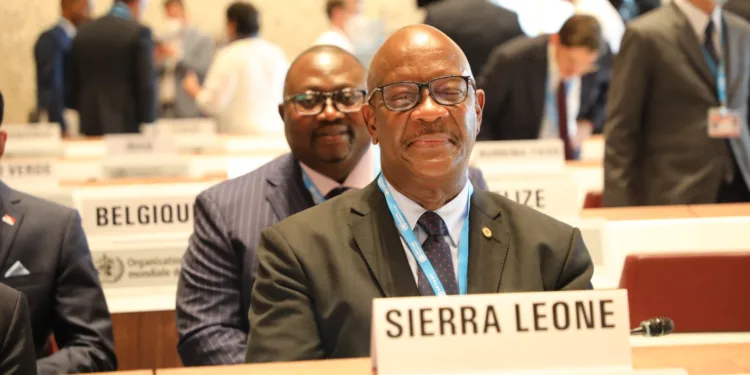Sierra Leaone’s Minister of Health, Dr. Austin Demby, reveals his vision of transforming Sierra Leone’s healthcare system at the 64th Annual Conference and Scientific Meeting of the West African College of Surgeons in Sierra Leone this week.
One of the major focuses of the conference is to provide adequate access to safe and affordable surgical and anesthetic care in West Africa.
The conference theme focused on the pressing need to address disparities in healthcare capabilities and capacities across the region, especially the critical importance of equitable access to quality surgical interventions.
Addressing attendees at the annual conference, Dr. Demby emphasized his dedication to boost the healthcare system. He said;
“I am dedicated to realizing the President’s vision of investing in people and human capital development. I see my role as focusing on the health aspect as we build our nation, ensuring that our people are healthy and able to achieve their fullest potential as individuals, family members, community and district members, citizens, and contributors to the continent’s prosperity.”
Sierra Leone faces a wide array of surgical needs, ranging from essential obstetric procedures to trauma surgeries, orthopedic interventions, and beyond. The demand for surgical services is substantial, with timely access to interventions being crucial for patients’ well-being.
However, the country’s current surgical capacity at the surgeon’s level is constrained, with only a limited number of residents and specialized surgeons available to serve a population of approximately eight million people.
Specifically, there are just 15 residents, six general surgeons, two orthopedic surgeons, and two urology surgeons operating within Sierra Leone, highlighting the significant gap between surgical demand and available expertise.
Addressing this disparity is essential for enhancing healthcare delivery and improving patient outcomes across the country.
Also Read: Health Workers In Africa Can No Longer Migrate To UK With Their Partners As Dependents
These are the key areas that require transformation in Sierra Leone’s healthcare system
To bring a significant transformation to Sierra Leone’s healthcare system, below are key areas Dr. Demby intends to work on.
1. Safe Surgery and Surgical Education
The healthcare system in West Africa lacks access to safe and affordable surgical and anesthesia care, which is critical in surgery.
Dr. Demby mentioned the critical need for collaboration and networking among African countries so as to leverage collective strengths and resources to address these gaps more efficiently.
Addressing the critical shortfall of surgeons in Sierra Leone, the approach will implemented by increasing the number of surgeons and subspecialties in surgery across the country.
The approach also involves giving resident doctors and Medical tertiary institutions access to several new residency programs and establish three new postgraduate schools.
Training will be given to community health officers in small communities so they can perform minor surgeries before referring patients to bigger hospitals.
In expressing his passion for safe surgery, Dr. Demby said,
“In our ongoing efforts to navigate the intricate healthcare landscape of Sierra Leone, my focus has gravitated toward the paramount importance of safe surgery and the urgent need for comprehensive surgical education. I wake up every morning determined to change healthcare delivery in this country. I am pleased to be surrounded by people who share the same determination.
It is unacceptable, with all the tools that we have, to have an HIV infection in this country for example. It is unacceptable for somebody to die from AIDS when we have all the tools available to us.
What we’re doing now is collaborating with our healthcare workforce throughout the country to instill this mindset that everybody’s life matters.
When somebody walks into a hospital or clinic, there’s a reason why they don’t go to the traditional healer. They go to the hospital with the confidence that they will get the care that they need, and that they will find compassionate people there who care about their health. I’m working with my team to ensure that people feel assured in seeking our assistance.”
2. Education, Health, and Food Security
The journey towards a healthier and more prosperous future begins with the right education. Sierra Leone’s healthcare system has placed a priority on investing in education to ensure knowledge acquisition and the development of individuals to their full potential.
An educated, healthy populace is better equipped to contribute to national development, breaking the cycle of poverty and fostering a robust society.
Food security is the third element in the triad. Recognizing that a well-nourished population is better positioned to thrive, both physically and mentally is a step in the right direction.
3. Collaboration with Organizations for Sustainable Solutions
Dr. Demby spoke extensively about collaborating with reputable bodies like Mercy Ship, an organization that’s instrumental in delivering surgical services and investing in training local healthcare professionals.
From nurses to anesthesiologists, technicians, counselors and everyone involved in healthcare would undergo intense training on how to attend and care for patients.
These initiatives signify a significant step towards building a self-sufficient healthcare system that can thrive long after Mercy Ships’ departure.
Additionally, the current gathering of the West African College of Surgeons to Sierra Leone in Freetown is a huge milestone, providing an opportunity to showcase our progress and foster collaboration among West African nations.
“We’re expecting over 700 surgeons from throughout the continent and beyond. They are here to have very candid deliberations on the state of surgeries in Africa, and what the future holds for the continent, and where we should be driving our focus.”
4. The Vision for Sierra Leone’s Healthcare Future
The Minister divided his vision for the future of Sierra Leone’s healthcare into four stages.
The first stage is primary healthcare; Emphasizing the importance of bringing the importance of healthcare to all Sierra Leoneans.
Currently, 85% of the population has a health facility within a five-kilometer radius of wherever they are. That’s an incredible level of access but it can be better.
The second stage involves staffing with a focus on increasing the number of skilled healthcare professionals, including surgeons. The ministry aims to enhance competencies, distribution, and retention, ensuring a well-balanced and competent healthcare workforce.
The third stage centers on the quality of healthcare, addressing the need for reliable equipment, preventive maintenance capabilities, and the availability of drugs.
The fourth stage involves health security, recognizing the importance of preparedness, rapid response, and containment in the face of health emergencies, such as a pandemic outbreak.
Meanwhile, Sierra Leone’s Ministry of Health launched a national Public Health Agency to ensure a coordinated emergency response. The agency has epidemiologists embedded in routine programs at the frontline, closely monitoring data from various health initiatives to detect any unusual activity early on.










